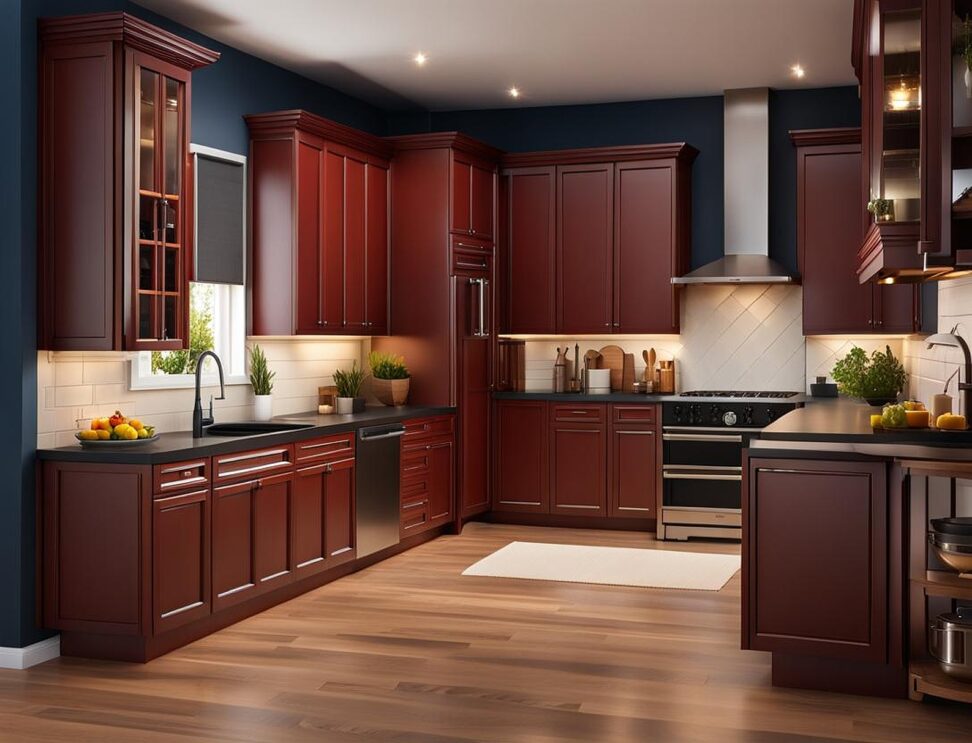Masterfully Remodel a Miniature Kitchen in No Time
With proper planning and execution, you can transform a small kitchen into a functional and visually stunning space. How long to remodel a small kitchen largely depends on several factors, but with the right approach, you can expedite the process without sacrificing quality or functionality.
Realistic Timeline for Small Kitchen Remodeling
The duration of a small kitchen remodel can vary significantly, ranging from a few weeks to several months. On average, a minor remodel involving cosmetic updates like painting, new countertops, and replacing appliances can take approximately 4 to 6 weeks. However, a more extensive renovation that includes structural changes, electrical or plumbing work, or reconfiguring the layout may require 8 to 12 weeks or longer.

It’s essential to remember that unexpected delays can occur due to factors such as material shortages, permit approval processes, or unforeseen issues that arise during the renovation. To avoid unnecessary setbacks, it’s crucial to plan meticulously, allowing for contingencies and maintaining open communication with your contractor or remodeling team. Establishing a realistic timeline from the outset can help manage expectations and ensure a smooth process.
Factors Influencing Renovation Duration
Several key factors can influence the timeline of your small kitchen remodel. Understanding these elements can help you prepare and make informed decisions throughout the process:
- Scope of work: The more extensive the changes you plan to make, the longer the renovation will take. Structural modifications, such as knocking down walls or reconfiguring the layout, will require more time and effort than surface-level updates.
- Permits and approvals: Depending on the extent of the remodel, you may need to obtain necessary permits from local authorities. The approval process can vary in duration, potentially causing delays if not accounted for. It’s essential to research and submit permit applications well in advance to avoid unnecessary holdups.
- Material availability: Sourcing materials, appliances, and fixtures can pose challenges, especially if you have specific preferences or are working with custom orders. Delays in material delivery can impact the overall timeline. To mitigate this, order materials early and communicate regularly with suppliers to ensure timely delivery.
- Contractor availability: Reputable contractors and tradespeople are often in high demand, and their availability may affect the start date and pace of your project. It’s advisable to book your contractor well in advance and discuss their availability to ensure a smooth transition from one phase to the next.
Additionally, the complexity of the design and the number of trades involved (electricians, plumbers, tilers, etc.) can further influence the timeline. A well-coordinated and organized approach is key to minimizing delays and ensuring efficient collaboration among the various professionals.
Cost-Effective Approaches to Expedite the Process
While a comprehensive remodel can be time-consuming, there are strategies you can employ to streamline the process and minimize disruptions to your daily routine. Consider the following cost-effective approaches:
- Phase the project: Tackle the renovation in phases, prioritizing the most critical areas first. This approach allows you to spread out the work and associated costs over time while still enjoying a functional kitchen. For example, you could start with updating the cabinets and countertops, followed by appliances, and finally address structural changes or layout modifications.
- DIY where possible: Roll up your sleeves and take on manageable tasks yourself, such as painting, installing hardware, or assembling flat-pack cabinetry. However, be realistic about your skills and leave complex tasks to professionals to avoid costly mistakes or delays. Consider your time availability and skill level before committing to DIY projects.
- Temporary kitchen setup: Create a temporary cooking space in another room or outdoor area to minimize downtime during the remodel. This strategy ensures you can still prepare meals without relying heavily on takeout or restaurant visits, which can quickly become expensive. A basic setup with a portable cooktop, microwave, and refrigerator can suffice for the duration of the project.
- Prioritize functionality: Focus on creating a functional and efficient kitchen layout before indulging in aesthetic upgrades. By addressing the core functionality first, you can start using your new kitchen sooner and then gradually incorporate design elements over time, spreading out the costs and minimizing disruptions.
To ensure your small kitchen remodel progresses smoothly and efficiently, consider these expert tips:
- Detailed planning: Invest time in meticulously planning every aspect of the remodel, from layout designs to material selections. This preparation will minimize delays and ensure a cohesive vision. Create a detailed schedule with realistic timelines, accounting for potential setbacks and overlapping tasks.
- Open communication: Maintain clear and consistent communication with your contractor or remodeling team. Address concerns promptly and collaborate to find solutions that keep the project on track. Regular check-ins and progress updates can help identify and resolve issues before they escalate.
- Flexible mindset: Embrace a flexible mindset and be prepared to adapt to unexpected challenges. Remaining open-minded and proactive can help you navigate obstacles and make informed decisions without significant setbacks. Be willing to consider alternative solutions if unforeseen circumstances arise.
- Quality over speed: While expediting the process is desirable, never compromise on quality for the sake of speed. A well-executed remodel will stand the test of time and provide lasting value. Prioritize craftsmanship, durability, and attention to detail to ensure a beautiful and functional kitchen that meets your needs.
By combining a realistic timeline, strategic planning, and expert guidance, you can masterfully remodel your miniature kitchen in no time, transforming it into a functional and aesthetically pleasing space that enhances your culinary experience and maximizes the potential of your compact kitchen.
Remember, a successful small kitchen remodel requires patience, meticulous planning, and a willingness to adapt to challenges. By embracing these principles and working closely with professionals, you can create a kitchen that not only meets your needs but also reflects your personal style and adds value to your home.